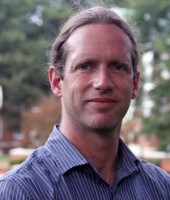Sean Downey
Sean Downey currently is an Associate Professor in the Department of Anthropology at The Ohio State University. His research focuses on the social and environmental dynamics of farming and foraging societies, both past and present. As an ecological anthropologist, he is interested in how human cultural and biological variability shapes interactions with the environment. His recent work explores adaptive self-organization in swidden agriculture and the development of computational and quantitative methods for studying coupled human-natural systems. He has conducted extensive ethnographic fieldwork in Belize and has received support from the National Science Foundation, including a prestigious CAREER grant. His interdisciplinary approach emphasizes transdisciplinary collaboration and innovation in data collection and analysis to address pressing questions of sustainability and resilience. He is the co-editor of Human Ecology: An Interdisciplinary Journal and he is leading the development of a Bachelor’s of Science degree in computational social science in the College of Arts and Science at OSU.
Sean Downey joins the Paris IAS in June 2026 for a one-month writing residency.
Research topics
Swidden agriculture; Maya Culture; History of Belize; Complex Adaptive Systems; Common-property Resource Management; Computational Social Science Methods and Theory.
Adaptive self-organization in swidden agriculture
This project develops a new theoretical framework for understanding swidden agriculture as an adaptive, self-organizing socioecological system. Swidden, often misrepresented negatively as “slash-and-burn,” involves cycles of forest clearing, cultivation, and fallow regeneration that support both biodiversity and human subsistence. Drawing on complex systems theory, the project explores how local social norms, labor reciprocity, and environmental knowledge interact with ecological processes to produce emergent patterns of resilience and sustainability.
Building on long-term ethnographic research with Q’eqchi’ Maya communities in southern Belize, the project challenges persistent colonial-era biases that have shaped negative perceptions of swidden. It critiques the flawed empirical-normative linkages in conservation science, drawing on philosopher Matthew Barker’s “unraveled rope problem” to expose how normative assumptions – such as those that shape biases against swidden agriculture -- can distort scientific conclusions. The project argues that swidden’s persistence across diverse environments and historical contexts is best explained through the lens of adaptive self-organization.
By synthesizing insights from anthropology, ecology, and complexity science, the project aims to reframe swidden as a sustainable and culturally embedded practice. It is written in accessible, non-technical language to engage a broad interdisciplinary audience and to enhance its impact outside the academy, in sustainable development and conservation policy arenas, and in society-at-large.
Key publications
Sean S. Downey, Matthew Walker, Jacob Moschler, Filiberto Penados. Juan Pop, Rongjun Qin, William Peterman, Shane Scaggs, Shuang Song. "Intermediate swidden disturbance increases spectral diversity in Maya community forests". Communications Earth and Environment, 4:428, 2023.
DOI: https://doi.org/10.1038/s43247-023-01089-6
Sean S. Downey, Drew Gerkey, Shane A. Scaggs. "The Milpa Game: a Field Experiment Investigating the Social and Ecological Dynamics of Q’eqchi’Maya Swidden Agriculture." Human Ecology, 48.4, 423-438, 2020.
DOI: http://doi.org/10.1007/s10745-020-00169-x
Sean S. Downey. "Q’eqchi’ Maya Swidden Agriculture, Settlement History, and Colonial Enterprise in Modern Belize". Ethnohistory, 62(4), 751-779, 2015.
DOI: https://doi.org/10.1215/00141801-3135338
|
|
|
|
|
|

